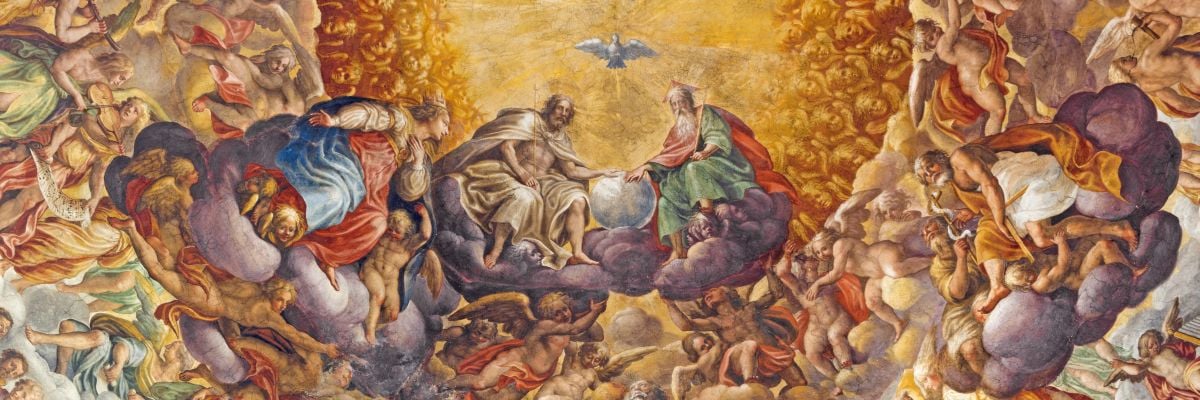
A verse often used by Jehovah’s Witnesses to disprove the divinity of Christ and the existence of the Trinity is John 17:3. In this verse, Jesus said, “Now this is eternal life, that they know you, the only true God, and the one whom you sent, Jesus Christ.”
“See,” say the Witnesses, “Jesus said the Father is the only true God. This means Jesus himself can’t be God.”
The Witnesses’ argument sounds persuasive until you consider what this text actually says and what other trinitarian passages of Scripture teach.
It’s true John 17:3 says the Father is the only true God. But notice this verse doesn’t say that only the Father is true God. A trinitarian can affirm the first statement, but not the second.
Why can we say the Father is the only true God? Because there is no other God than the God whom the Father is. In Isaiah 44:6 God said, “I am the first and the last, and besides me there is no other God.”
A chapter earlier he declared, “Before me there was no God formed, and after me there continued to be none. I am Jehovah, and besides me there is no savior” (Isaiah 43:10) [New World Translation].
So God is not merely one God among many. He’s the only true one. The Father is that God who is the only true God. But this doesn’t prove, as the Watchtower claims, that only the Father is true God.
Trinitarians say the Father is the only true God, the Son is the only true God, and the Holy Spirit is the only true God. All three Persons are the one, true God, as opposed to three Gods.
Why does John 17:3 speak only of the Father as “the only true God” if Jesus and the Holy Spirit are also God? To answer this, we must look at how Scripture speaks of the triune God.
The bible frequently attributes to one Person of the Trinity a title or name which actually belongs to all three. Theologians call this appropriation. This is how the biblical writers, in lieu of more technical, philosophical language, distinguished the Persons in God.
For example, the Father is generally called ho theos (“the God”). The Son is usually ho kurios (“the Lord”). The Third Person of the Trinity is spoken of as to pneuma (“the Spirit”) or to pneuma to hagion (“the Holy Spirit”).
Although the three Persons of the Trinity are often distinguished in the New Testament by these titles, none of these names is the exclusive possession of any particular Person. For example, while the Father is usually the one addressed as ho theos (“the God”), Christ is also occasionally spoken of in this way. In John 20:28 the apostle Thomas, upon seeing the resurrected Jesus, said to him, “My Lord and my God!” The Greek text literally reads, “The Lord of me and the God of me” (“ho kurios mou kai ho theos mou”).
Notice two things here. First, Thomas called Jesus “ho theos” (“the God”), which is the same expression used commonly of the Father. Second, Jesus didn’t rebuke him for what would be blasphemy if untrue, but instead praised Thomas (John 20:29).
Jesus is usually called“ho kurios” (“the Lord”), in the New Testament, yet the Witnesses don’t think this diminishes Jehovah’s Lordship. The Watchtower zeros in on the word “only” in John 17:3, pointing out how it says the Father is the only true God.
Yet Jude 4 says Christ is “our only Owner and Lord” [NWT]. Does the word “only” here mean Jehovah is inferior to Christ?
In 1 Corinthians 8:6 Paul wrote, “For us there is one God, the Father, from whom all things are and for whom we exist, and one Lord, Jesus Christ, through whom all things are and through whom we exist.” The Witnesses will quote the first half of the verse to prove Jesus isn’t God. They point to how it says the Father is the one God, implying, they say, that the Son isn’t the same God.
By this argument Jehovah isn’t Lord, since the verse says there’s only one Lord, Jesus. Are we to conclude that while Jehovah may be God, he’s not Lord? No Jehovah’s Witness would say this, yet the New Testament usually reserves the title of Lord for Jesus.
In general, the Bible calls the Third Person of the Trinity to pneuma (“the Spirit”) or to pneuma to hagion (“the Holy Spirit”) and makes it clear that he’s distinct from the Father and the Son (John 14:16, 26; 15:26). Yet Scripture also refers to the Holy Spirit as the Spirit of God and as the Spirit of Christ (Rom. 8:9).
In 2 Corinthians 3:16-18 Paul identified the Spirit with ho kurios (“the Lord”): “Whenever a person turns to the Lord the veil is removed. Now the Lord is the Spirit, and where the Spirit of the Lord is, there is freedom. All of us, gazing with unveiled face on the glory of the Lord, are being transformed into the same image from glory to glory, as from the Lord who is the Spirit.”
(Interestingly, the Witnesses’ New World Translation of 2 Corinthians 3:16-18 replaces “Lord” with “Jehovah,” so we can say “Jehovah is the Spirit.” This means the Holy Spirit can be identified as Jehovah, not merely as his active force as the Witnesses claim.)
Back to John 17:3. What Jesus did here is merely an example of a common New Testament practice: taking a term applicable to all three Persons in God and using it preferentially for one of the Persons, thus making it easier to distinguish him from the other two.
Why did the New Testament writers talk about the Persons of the Trinity like this rather than as “three Persons in one divine nature”? Because that terminology wasn’t available yet.
The New Testament writers (and God who inspired them to write) used the expressions and terminology of the day to convey the truth of the triune God. The idea of three Persons in one God is biblical, even if the phraseology isn’t found there.
John 17:3 says the Father is the only true God. But it doesn’t teach what the Witnesses desperately want to make it teach: that only the Father is true God. It’s this error which a careful study of the New Testament refutes.



